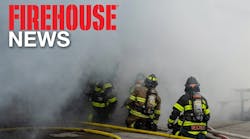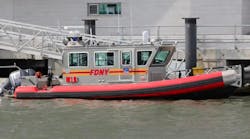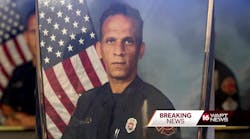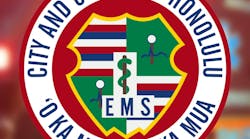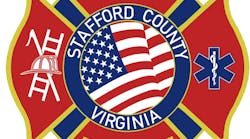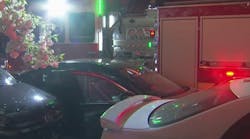I can recall a discussion that a number of us had at a Fire Department Instructor's Conference in Indianapolis a number of few years ago. A group of my fire buddies and I spent quite a bit of quality time discussing the state of affairs in the fire service.
A central topic in our debate involved the fact that younger firefighters and officers did not seem to know and be aware of what we aging veterans took as gospel. We should note that this was a debate stimulated by a variety of libations at an Indianapolis hotel watering hole.
Those of us who became engaged in the discussion, all appeared to be on the long side of age 50. Each of us had been in the fire service at least since Lyndon Johnson was President. There were those, however, who harked back to the Kennedy and Eisenhower years. We mention this to give a perspective on the discussion.
We were comparing notes on the problems inherent in the delivery of fire protection and EMS. As with all long-serving fire officers, opinions were available on any topic that came up for discussion. At some point during the evening's festivities, an interesting counterpoint was noted.
Each of us on the north side of the table was over the age of 50 years. All of the folks on the south side of the table were 30 years of age or younger. We began to notice quizzical looks on the faces of the younger firefighters when the topic of conversation turned to the late, Emanuel Fried, the late Lloyd Layman, the late John T. O'Hagan, and the late Abbott and Costello.
While each of us on the north side of age 50 nodded knowingly about the wisdom imparted by Fried, Layman, and O'Hagan, our younger associates puzzled over which stone-age characters we were discussing. The part that shocked me was that none of these younger troops knew who Abbott and Costello were.
For you younger types, they were a burlesque comedy team who achieved a certain amount of Hollywood and television fame in the 1940's and 1950's for their zany antics: such as the "Who is on First" routine, seen on late-night and early AM television.
As that long-ago evening wore on, we older lads took great pains to share our collective wisdom with the younger troops at the table. It then occurred to us that we had just identified one of the primary problems at work throughout the fire service. We older troops simply take for granted that the younger people will automatically know what we are talking about. The corollary to this is that on the fireground, we expect our newer troops to automatically act and perform like we veterans do.
A few years after this fateful FDIC discussion, this fact was reaffirmed during the Firehouse Expo in Baltimore. My daughter attended the event with us and ended up going out to dinner with a number of us wily, old veterans. As we were spinning tales and telling war stories, this topic of shared knowledge came up. Again it was a discussion among grey-haired veterans. However, at one point my pal Jack Peltier pointed at Katie and said, "...let's ask her what the problem is."
This we did. I still have the notes from that fortuitous dinner engagement. She told us point blank that she thought that we expected our young people to know things just because we did. Since she had just completed the Firefighter I program at our county fire academy, her experiences were quite fresh.
She suggested that each of us explore the level of knowledge amongst our students and work from there. Now you may be saying to yourselves, Harry is telling us nothing especially brilliant here. But that is just the point. Some of our greatest problems in the fire service come from the fact that we take too much for granted.
After nearly 40 years in the business, a great deal of what I do is ingrained. I act or react based upon a body of knowledge accumulated over a long period of time. How can I possibly expect someone who was born in 1987 to know things that I learned in 1966 or 1976, or 1986?
The same holds true for many of you out there in reader land. And let us suppose that you have been out of the suppression division for a few years, (or more than a few in some cases). You do not have recent field experience. A whole new generation enters the fire service about once a decade. If you do not learn about them and how they learn, they will be unable to benefit from your wisdom, because you will either:
- Fail to share it.
- Not know how to share it.
- Share it in a way that will not be understood.
- Share it in a way that will alienate people.
- Not realize that it needs to be shared.
These are all areas that we should work to overcome.
The same thing can happen to you as a field commander. If you fail to look at the people who are being transferred into your command, you will miss the fact that younger people are different: Not good or bad, just different. You need to know who is working for you and how they think, act, and live their lives.
A close friend of mine, Wally Brownlee, who just happened to be appointed to the Newark Fire Department and promoted to Battalion Chief on the same dates as me, summed it up quite well a couple of years ago. He said to me that the younger firefighters were different than us in many ways. On the one hand there were not a lot of veterans who had been taught how to take orders and be part of a team in the military. However there was another area where he saw this on a frequent basis was on the fireground.
When we were young fire lads, hanging off the back of Mack pumpers and going to fires every night, our aggressive tendencies were well known. If the fire was on the third floor, we were going to make the third floor, come hell or high water. If you were blown down the stairs by the fire on the first try, we would pick ourselves up, dust ourselves off and try again.
If you didn't make it on the second try, you would keep going until you made it. You did this because the veterans who broke us in and our buddies expected it. In other words, it was a behavior that had been passed down to us from previous generations. And we did it without the array of firefighting body armor which we wear today.
Trust me when I tell you that Wally and I have discussed this topic on a number of occasions over the years. I have decided that may people from our generation were a part of the problem. A number of my buddies and I have asked ourselves a series of questions about how we have done our jobs. Let me offer these questions to you for your review and comment.
It may be that we were a bit more suicidal than we needed to be, but that was the way we fought fire in those days. I believe that all of us have (or should have) developed a better sense of when to go into the building to fight the fire and when to surround the building and drown the fire with master streams. We no longer should be smothering fires with large numbers of firefighters
However, there are a couple of other questions we need to ask. As veterans, have we drilled our people often enough? Have our drills covered topics that were relevant? Have we shared our decades of experience with the newer people?
Have we counseled them on what we expect from them on the fireground? Have we reviewed their operations on the fireground, and discussed their strengths and weaknesses? Have we identified and corrected the mistakes we have identified. In many instances, the answers have not been all that great.
Think about this. How can you and I yell at our troops for making mistakes if we fail in our job of passing along the institutional knowledge we have gained at the expense of the citizens of our communities. During my career I spent a great deal of time in busy areas of the City of Newark. My friend Wally spent much more time than me in these areas. Heck, he is still on the job rolling out on alarms years after I retired.
We fought fire during the busy years of the 1970's and early 1980's. The people who taught us to be good firefighters are long gone. Hell, in too many cases they have gone on to their reward. If we do not take the time to pass on the gifts of knowledge that they shared with us, we do dishonor to their memory. The best way to repay a gift is to keep on giving.
Perhaps that is why I spend so much of my time writing and sharing with you. I would hate to have someone die when their death could have been prevented because of something that I know being shared with you.
During my time as Commandant of Training in Newark, I worked closely with to frequently share the contents of our Training Academy's video library with members of the suppression division. Wally was one of the folks who took great pains to conduct both classroom drills and street sessions. He did a great deal to improve the quality of the people in his battalion.
He has been my model when I think of how things should be done. Many of the people in his battalion have been promoted and gone on to share his way of doing things with the newer generations of Newark firefighters. That is a fabulous legacy.
I have discovered that an apparent shortcoming in the fire service of the early 21st Century is the loss of institutional knowledge. Even the largest cities have recognized this with their back to basic programs, and their firefighters saving themselves programs.
Things that we learned by doing them in the 1970's, 1980's and 1990's must now be written down and passed along to the next generation. Our fire loads nationwide may be down, but when a fire occurs, the danger is still there, and it is greater since it is experienced with a diminished frequency.
The morale is quite simple. Write things down while you can still remember them. Then pass the important messages on to the next generation. It can be our strongest legacy. Particularly for those of us who plan to be at the FDIC in 2025 when it will be your turn to sit on the veteran's side of the table.
